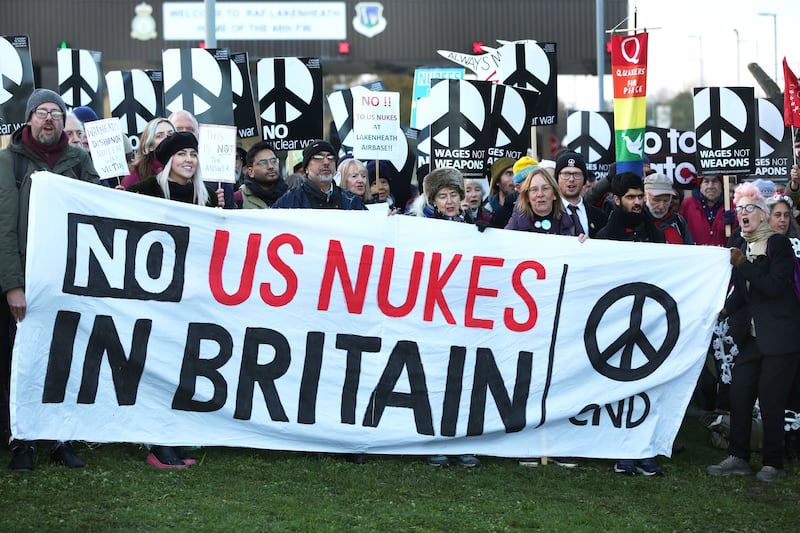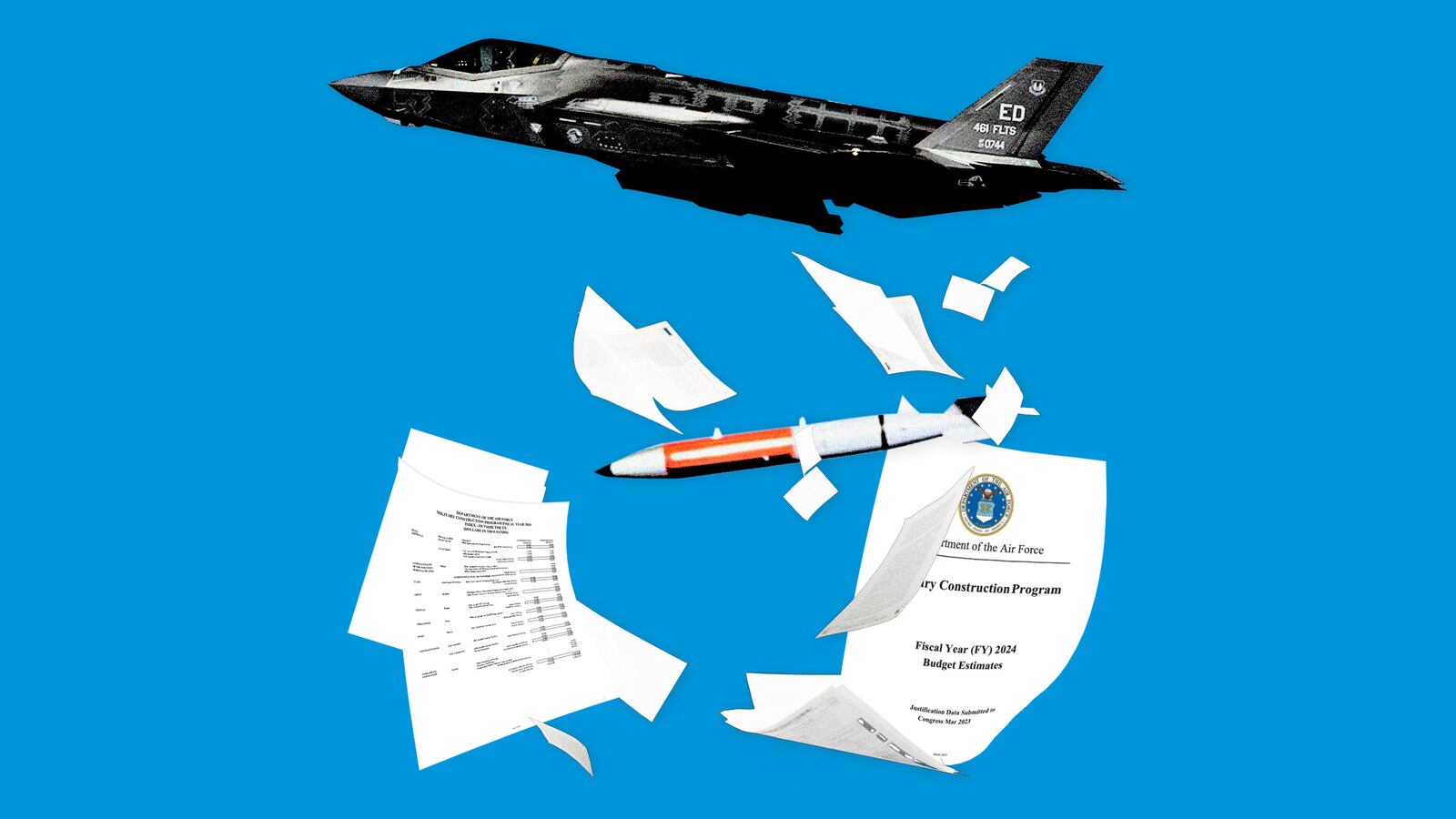The United States may be looking to station nuclear weapons in the United Kingdom for the first time in 15 years—and the move threatens to set off a tidal wave of controversy, backlash, and hostility from Russia, according to U.S. Air Force budget documents and experts.
Notes in a document detailing the U.S. Air Force budget for 2024 indicate that the Air Force has plans to construct what’s called a “surety dormitory” at Royal Air Force (RAF) Lakenheath, a base 70 miles northeast of London. It is the largest U.S. Air Force-operated base in England.
The plan is to “construct a 144-bed dormitory to house the increase in enlisted personnel as the result of the potential Surety Mission,” the document states.
This language is typical jargon that refers to the handling of nuclear weapons, according to Matt Korda, a senior research fellow for the Nuclear Information Project at the Federation of American Scientists, who first reported on the suspected changes from the Air Force.
“Surety is this word that is used within the DOD and the Department of Energy context specifically to refer to the maintenance and storage of nuclear weapons,” Korda, who previously worked for the North Atlantic Treaty Organization (NATO) in the Arms Control, Disarmament, and WMD Non-Proliferation Centre in Brussels, told The Daily Beast.
The Pentagon document also includes details about dormitory arrangements for “the influx of airmen” arriving for “surety mission,” adding that there “is a significant deficiency in the amount of unaccompanied housing” at the Lakenheath base.
If the Biden administration acts upon the plans, it would be the first time in the United States has deployed nuclear weapons to the U.K. since 2008, when President George W. Bush ordered a withdrawal of B61 munitions from Lakenheath.
The little-known update comes as Russian President Vladimir Putin has grown increasingly assertive about his nuclear arsenal, slinging nuclear threats left and right at NATO countries as his war against Ukraine rages on. In recent months, Moscow has made moves to deploy tactical nuclear weapons to Belarus, which neighbors the NATO countries of Poland, Latvia, and Lithuania, in addition to Ukraine.
The alarming behavior has left U.S. officials, at times, working to guess what actions Putin may interpret as escalation and push him over the edge. Some officials have harbored concerns in recent months that Ukrainian efforts to push Russia out of Crimea could maybe be a nuclear red line for Putin, as The Daily Beast reported. Moscow has illegally occupied the peninsula since 2014.
The United States has stored nuclear assets in other countries in Europe since the 1950s, initially as insurance against the Soviet Bloc.
In recent years, the United States has stored nuclear weapons—specifically B61 nuclear bombs or gravity bombs—in Belgium, Germany, Italy, the Netherlands, and Turkey. FAS estimates that there are 100 gravity bombs currently deployed in Europe.
But in the U.K., U.S. officials have been working to reshape and enhance the United States’ nuclear mission. This is not the first time the U.K. has entertained upgrades to the U.S. nuclear weapons mission on British soil. Last year, military bunkers in the U.K. were slated to be upgraded so they could safely store U.S. nuclear weapons, other budget documents show.
The current planned updates to prepare for a possible “surety mission” suggests the United States is preparing to be able to respond to any slick and dangerous nuclear moves from Russia, Korda told The Daily Beast.
“There’s a potential for a real nuclear crisis with Russia,” Korda said. “Perhaps they’re preparing this base at Lakenheath to be able to receive weapons in the midst of some kind of crisis.”
RAF Lakenheath’s stated mission is to be able to provide global combat airpower and support.
More plans are in the works for the U.S. nuclear mission in the U.K.. The Air Force also has a series of “future projects” planned, including a Surety Barrier System, a Surety Defender Operations Center, and a Surety Primary Command Post, according to the budget documents.
It’s not clear that a decision has been made to permanently store nuclear weapons in the U.K.. But the United States is likely leaning into the idea that it needs to be able to move quickly in the face of Russian nuclear threats, and has determined that making preparations in the U.K. is a prudent move at this moment in history.
“There’s this increased emphasis on flexibility with with regards to the deployment of nuclear weapons,” Korda said.
Russia has already responded with disdain at the prospect of the United States expanding its U.K. nuclear mission. The Kremlin said it will interpret any move to transfer U.S. nuclear weapons to the U.K. as an “escalation,” Russian Foreign Ministry spokesperson Maria Zakharova said this week.
“If this happens, it will be treated by us as an escalation, which will lead to the exact opposite of achieving the pressing task of removing all U.S. nuclear weapons from Europe,” Zakharova said, according to TASS.

Protesters outside Lakenheath air force base on Nov. 19, 2022, England.
Martin Pope/Martin Pope/Getty ImagesA Grave Warning
The nuclear assets in question, though, may be more about sending a political message to Russia than anything else, warned Miles Pomper, a senior fellow at the James Martin Center for Nonproliferation Studies of the Middlebury Institute of International Studies at Monterey.
“The weapons, from a military point of view are actually not all that useful,” Pomper said. “If you wanted to use these weapons of war… you would have to have a vote of the alliance with consensus to do it. So imagine trying to do that in the middle of a war.”
The move would coincide with recent warnings from officials who have suggested that Russia will target other countries after Ukraine.
It also likely serves as a message of assurance to NATO countries that the United States will make good on its promises as a member of the alliance to treat attacks on allied members as attacks on all members, and respond collectively.
It’s “something that United States places in different countries in Europe in order to indicate that it is committed to the defense of Europe—that if there was some kind of nuclear conflict in Europe that the U.S. would still participate in Article Five commitments” to come to collective defense, Korda said.
But the shifting landscape of where the United States deploys its nuclear weapons could be the latest sign that attitudes towards nuclear weapons are shifting, especially as Russia grows more brazen with its nuclear threats.
In 2020, a parliamentary motion to have the Belgian government remove the presence of U.S. nuclear weapons from Belgium was raised. The following year in Germany, the Social Democrats’ (SPD) and the Greens’ election platforms relied on calls to remove U.S. nuclear weapons from the country. Calls to remove U.S. nuclear weapons from the Netherlands and Turkey have been floated as well.
But those debates seem to have all but dried up in the face of Russia’s increasing belligerence, according to Korda.
There were “some really significant debates about whether or not these weapons should be removed entirely, and that the U.S. should take them back to home soil. And then Russia invaded Ukraine. And all of those debates immediately kind of stopped,” Korda said.
In the U.K., meanwhile, the move to station U.S. nuclear weapons at Lakenheath could be controversial. According to a survey conducted last month from the Campaign For Nuclear Disarmament (CND), 20 percent said they were somewhat opposed to the idea, and 39 percent were strongly opposed.
The U.K. and the United States are likely concealing their plans in order to avoid public backlash, CND’s General Secretary Kate Hudson said.
“When polling reveals that almost two-thirds of the British public are opposed to U.S. nuclear weapons in Britain, it’s no surprise that the U.K. and U.S. governments don’t want the issue openly discussed,” Hudson said. “But with awareness of this dangerous deployment growing, so too will the opposition.”






